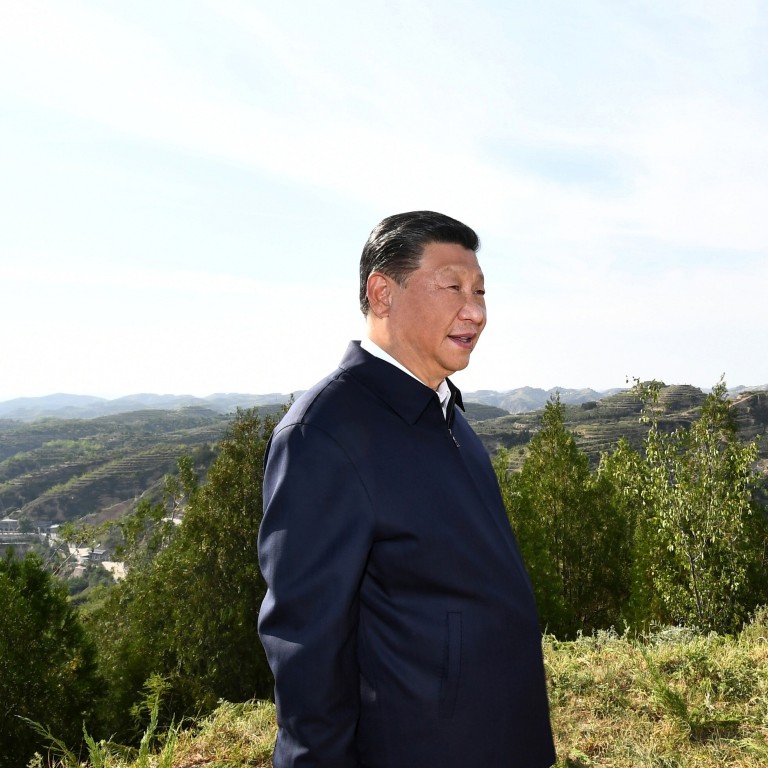
Who is Xi Jinping? Looking for new clues in Communist Party tributes
- A series of articles in the Central Party School’s main newspaper show a consistent focus on party control in the economy and ideology
- Xi’s approach goes back to his days in Zhejiang and then Shanghai before his promotion to the top job in Beijing
While the articles try to portray Xi in a favourable light in the lead-up to the expected endorsement of his third term at next autumn’s party congress, they also offer details of his approach to governance that were not previously known to the public.
China’s top universities told to stop slacking off on Communist Party ideology
One of the key themes in the articles is Xi’s longstanding interest in asserting party control over the economy and ideology.
When Xi came to power in late 2012, one of his first major decisions was to revive the then low-profile Central Leadership Group on Financial and Economic Affairs. Xi put this group in the spotlight and chaired it himself, using it to steer economic policy, challenging the long-held perception about the State Council as the main driver of the country’s economic direction.
Over the past three weeks, Study Times has traced this concept back a decade to his time as the party chief of Shanghai in 2007. In an earlier set of interviews published in April, the paper tracked back to 2003 and his leadership in the coastal province of Zhejiang. In each place, Xi founded the first such groups in both provinces soon after his arrival.
“Secretary Xi said he wanted to strengthen the party’s leadership in the economy, and set up a financial and economic leadership group in the Shanghai municipal party committee,” Zhou Weizhong, then with the general office of the Shanghai party committee, was quoted as saying.
“This was unheard of in Shanghai, so we asked our comrades in Zhejiang province [for advice].”
Hu Qingguo, who was then with the general office of the Zhejiang party committee, said the group was responsible for giving guidance or making key decisions on economic affairs.
“The agenda was usually set by Secretary Xi personally,” Hu said in the April interviews.
“Usually there was a meeting every month or two, with two to three issues [for discussion in] each.”
Landmark gathering of China’s Communist Party elite set for November
Zhejiang established the precedent for Shanghai, which then became a model for the central leading group in Beijing five or so years later.
In March, the commission vowed to step up enforcement against monopolies, with regulators slapping a series of antitrust fines in the following months on the country’s tech giants, including Alibaba, which owns the South China Morning Post.
Xi Jinping says Big Tech crackdown is making progress, calls for Communist Party to ‘guide’ companies
Another thread from Xi’s Shanghai days was his strict adherence to the central party line in an era when orthodox doctrine had waned across much of the country.
According to Study Times, Xi was keen on making sure media outlets in the city knew what the party line was and toed it.
He ordered the main television station in Shanghai to run live broadcasts of Xinwen Lianbo, China Central Television’s daily 7pm news broadcast and the most politically important news programme aired from Beijing.
After learning that Dragon TV was the only satellite TV service in the country that did not do so, Xi personally twice ordered it to relay the broadcast daily, according to Zhu Jihua, the then head of the municipal party committee’s general office.
“[Xi said] CCTV’s Xinwen Lianbo did not just represent the television station itself but the voice of the party’s central leadership,” Zhu said.
Landmark gathering of China’s Communist Party elite set for November
The focus on the party line extended to what Xi called “two-faced people”, cadres who paid lip service to political loyalty in the party and government.
At a meeting Shanghai in 2007, Xi invoked Zhuge Liang, a Chinese military strategist from the Three Kingdoms era (220 to 280 AD), to use seven criteria in assessing officials, including how they behaved when drunk, according to Wang Zhan, then the deputy party secretary general of Shanghai. “Secretary Xi said [we had] a very small cohort who were good at being ‘two-faced people’ and disguising themselves, and that we needed to better supervise officials,” Wang said.

